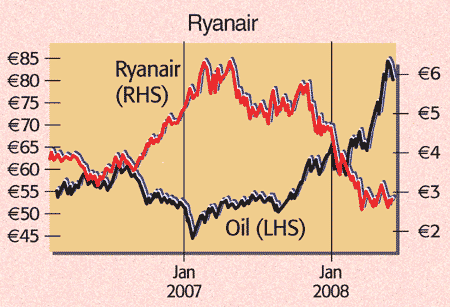
Ryanair and its rivals have a great deal to answer for – from helping fuel an ill-fated property boom in Spain, to introducing the charming city of Prague to the rather less charming British stag weekend. But with fuel prices tearing apart their business plans, we’re about to lose the one wonderful thing that budget airlines have brought everyone across Europe over the past decade – cheap air travel.
Budget airlines are in crisis. With the fuel bill for the global airline industry on course to rise to $50bn this year and consumers fretting over their dwindling personal finances, no-frills carriers will have to give up their promises of £1 plus tax flights to the continent. For every $1 rise in the price of crude above $65 a barrel, an airline such as Ryanair is taking on e14m in operating costs.
Some airlines are already having trouble putting fuel in the tank – at least a dozen carriers have collapsed in the past six months. Four airlines operating UK flights have gone to the wall. Business class airline Silverjet has had to abandon operations after funding problems. “This is the death-knell for small carriers,” according to British Airways CEO Willie Walsh. But with oil at these levels, even big carriers such as BA are having to raise fuel surcharges to make ends meet.
So can budget airlines do anything to survive? Fares will have to rise; budget carriers are already managing this by stealth, charging for add-ons such as speedy boarding. But they’ll have to make every effort not to kill their market by lifting prices too far. Ryanair has grounded 10% of its fleet so it can cut down on fuel bills, parking 20 planes in Stansted and Dublin for the winter. Jobs will be cut, routes abandoned, and they’ll try to renegotiate contracts with airport operators and baggage handlers.
Ryanair boss Michael O’Leary is also certain to battle British airport operator BAA’s plan to increase landing charges by 86% over the next five years. He may have some success – industry body IATA’s Giovanni Bisignani railed against the plan this week, saying the airport operator was living in Monopolyland if it thought it could bring about such a massive lift in charges after having made a “national embarrassment” of itself over the last year.
But the hard fact remains that with most budget airlines no longer hedging their fuel costs, the basic business of budget airlines simply looks unsustainable. Ryanair and easyJet, with leaner cost bases than big carriers such as BA, are likely to sit on low fares in the hope that smaller players will be shaken out of the market. After all, the US airline that Ryanair based its business model on, Southwest Airlines, has managed to see out three recessions since adopting the low-cost/low-fare strategy.
But it will be a painful wait. Budget airlines will suffer huge losses, eating themselves alive as they play a “last plane standing strategy”, Deutsche Bank analyst Chris Reid told The Independent. Many predict that only Ryanair and easyJet will be left once the battle plays out. Beyond that, “the outlook is entirely dependent on oil”, said O’Leary this week.
And while the oil price may well drop from $130 a barrel over the next year, a return to the levels that made cheap flights so easy to offer in the first place seems highly unlikely. We look below at why this could be the end of the line for cheap air travel.
Budget airlines: we’ve heard it all before, but this time it’s different
How bad will it get for budget airlines this time round? Well, there were dire predictions about their survival as recently as 2004, notes Lex in the FT. There were failures at the time, but their places were quickly taken by other start-ups.
The chart above might give some indication as to why it’s different this time round. It shows the price of crude oil in euros over the last two years, against Ryanair’s share price in that time. With oil dropping below e45 a barrel at the end of the 2006, Ryanair had a field day as it carried record volumes of passengers. But a 20% jump in passengers over the past year has done little to offset fears over rising costs as oil prices soared, with the shares losing 40% of their value this year alone.
While Ryanair and easyJet are lean enough to see out a consumer downturn this time round, it will be a formidable task to sustain their low-cost business model in the face of permanently higher oil prices. That in turn will make it harder to maintain the gap between their prices and those of their larger rivals.
As passengers find themselves being charged for ‘extras’ they once considered basic services – such as carrying bags and checking in offline (some airlines are even talking about charging passengers by weight, reports Bloomberg) – their focus may once again return to comfort and customer service, rather than simply finding the cheapest way to get from A to B.